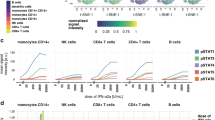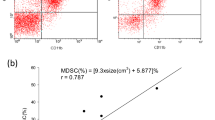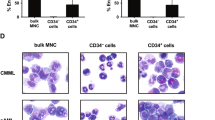Abstract
Research in cytokine biology has grown exponentially in recent years as cytokines (often also termed growth factors) are now known to be involved in a wide range of pathological and physiological processes. Continuous human leukemia cell lines represent powerful tools to investigate these mechanisms. Most cell lines grow autonomously in standard culture media (containing fetal bovine serum) independent of externally added growth stimuli. Over the last 5–10 years a battery of myeloid leukemia-derived cell lines has been established that is constitutively dependent on the addition of cytokines to the culture. Such factor-dependent cell lines die rapidly by apoptosis when deprived of the appropriate growth factor. We determined the cytokine response profiles of 19 absolutely growth factor-dependent leukemia cell lines with myelomonocytic, erythroid or megakaryocytic phenotypes with regard to enhanced or suppressed cellular proliferation. Cells were incubated in liquid culture with optimal concentrations of various recombinant human cytokines known to have effects on the growth of hematopoietic cells. A proliferative or anti-proliferative response to these 41 cytokines was assessed by the short-term 3H-thymidine uptake assay. A proliferative response was considered as positive when the stimulation index (SI) was >2; inhibition was regarded as significant with an SI <0.5. the response profile of each cell line to these 41 cytokines was different and individual. none of the cell lines responded to one or two factors only (minimum to at least five cytokines). proliferation of most (n = 13–17), but not of all cell lines was significantly enhanced by GM-CSF, IL-3, PIXY-321, SCF and IFN-γ. TGF-β 1 consistently inhibited proliferation (in 11/19 cell lines). IFN-α, IFN-β, TNF-α and TNF-β had either stimulatory or inhibitory effects. The cell lines responding most often proliferatively (to 15–19 different cytokines) were UCSD/AML1, HU-3, TF-1 and M-07e. In summary, these factor-responsive human leukemia cell lines represent extremely useful model systems for the analysis of cytokine effects on hematopoietic cells. The cytokine response profiles of the individual cell lines provide guidelines for the selection of the appropriate cell culture for such experiments.
This is a preview of subscription content, access via your institution
Access options
Subscribe to this journal
Receive 12 print issues and online access
$259.00 per year
only $21.58 per issue
Buy this article
- Purchase on Springer Link
- Instant access to full article PDF
Prices may be subject to local taxes which are calculated during checkout
Similar content being viewed by others
Author information
Authors and Affiliations
Rights and permissions
About this article
Cite this article
Drexler, H., Zaborski, M. & Quentmeier, H. Cytokine response profiles of human myeloid factor-dependent leukemia cell lines. Leukemia 11, 701–708 (1997). https://doi.org/10.1038/sj.leu.2400633
Received:
Accepted:
Issue Date:
DOI: https://doi.org/10.1038/sj.leu.2400633
Keywords
This article is cited by
-
Spray-Dried and Spray-Freeze-Dried Powder Formulations of an Anti-Interleukin-4Rα Antibody for Pulmonary Delivery
Pharmaceutical Research (2022)
-
Human leukocyte antigen class II quantification by targeted mass spectrometry in dendritic-like cell lines and monocyte-derived dendritic cells
Scientific Reports (2021)
-
DNA methylation regulates expression of VEGF-R2 (KDR) and VEGF-R3 (FLT4)
BMC Cancer (2012)
-
Acute promyelocytic leukemia cell line AP-1060 established as a cytokine-dependent culture from a patient clinically resistant to all-trans retinoic acid and arsenic trioxide
Leukemia (2004)
-
New acute myeloid leukemia-derived cell line: MUTZ-8 with 5q−
Leukemia (2002)



